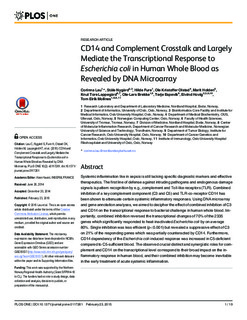CD14 and complement crosstalk and largely mediate the transcriptional response to Escherichia coli in human whole blood as revealed by DNA microarray
Lau, Corinna; Nygård, Ståle; Fure, Hilde; Olstad, Ole Kristoffer; Holden, Marit; Lappegård, Knut Tore; Brekke, Ole Lars; Espevik, Terje; Hovig, Johannes Eivind; Mollnes, Tom Eirik
Journal article
Permanent lenke
http://hdl.handle.net/11250/2372550Utgivelsesdato
2015Metadata
Vis full innførselSamlinger
Sammendrag
Systemic inflammation like in sepsis is still lacking specific diagnostic markers and effective therapeutics. The first line of defense against intruding pathogens and endogenous damage signals is pattern recognition by e.g., complement and Toll-like receptors (TLR). Combined inhibition of a key complement component (C3 and C5) and TLR-co-receptor CD14 has been shown to attenuate certain systemic inflammatory responses. Using DNA microarray and gene annotation analyses, we aimed to decipher the effect of combined inhibition of C3 and CD14 on the transcriptional response to bacterial challenge in human whole blood. Importantly, combined inhibition reversed the transcriptional changes of 70% of the 2335 genes which significantly responded to heat-inactivated Escherichia coli by on average 80%. Single inhibition was less efficient (p<0.001) but revealed a suppressive effect of C3 on 21% of the responding genes which was partially counteracted by CD14. Furthermore, CD14 dependency of the Escherichia coli-induced response was increased in C5-deficient compared to C5-sufficient blood. The observed crucial distinct and synergistic roles for complement and CD14 on the transcriptional level correspond to their broad impact on the inflammatory response in human blood, and their combined inhibition may become inevitable in the early treatment of acute systemic inflammation.
